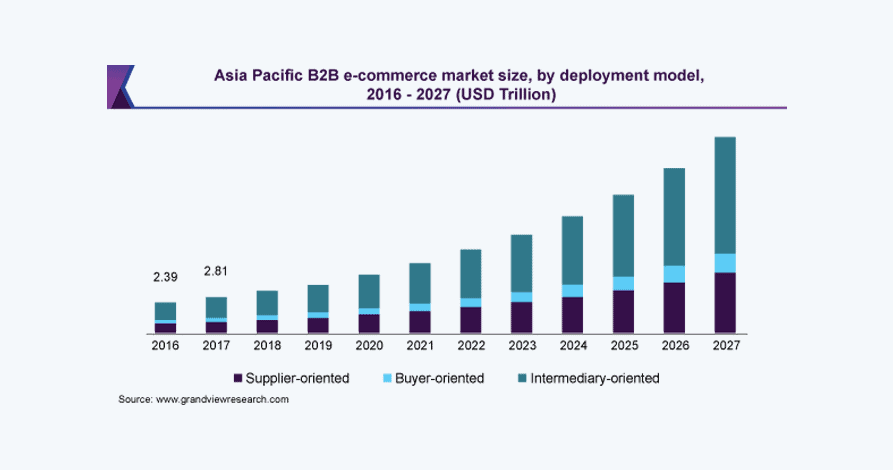Isn’t the current times full of ease and you need not worry about anything as you find every possible solution at your fingertips. The development of e-commerce websites is continuously increasing and making many advancements within the marketplace. The concept of this technique is described as electronic commerce where one can sell or buy goods with the help of electronic or digital platforms. The development of these websites made and is continuously making many changes in the market. This e-commerce market runs at different segments when it comes to choosing a platform. Such as computers, smartphones, and tablets. This shows the expanding nature of the e-commerce marketplace. The research data Grand View Research highlights the same aspect.
 Source: Grand View Research, 2023
Source: Grand View Research, 2023
According to the figure above the market value of e-commerce website development was recorded at USD 9.09 trillion in 2019. That is expected to grow at the compound annual growth rate of 14.7% within the timeframe of 2020 to 2027. This highlights that the website development market is continuously increasing. But somewhere this rapid increment is also challenging, while facing the condition of excessive user traffic. Scalability is a key issue in the e-commerce market especially when these issues are related to website development. Such challenging conditions can cause different consequences. Such as server downtime, database bottlenecks, unexpected traffic spikes, and slow response of the website functions.
This blog will guide you through the major scalability challenges involved with e-commerce website development practices. While discussing these challenges, the major highlights are going to be the challenging consequences of such scalability factors. And different solutions for dealing with these issues. Let’s which scalability solution suits the best for your e-commerce website traffic issues. Give this a quick read.
Key Scalability Challenges of E-Commerce Website
1. Traffic Peaks and Surges
E-commerce app development companies must implement robust scalability measures to efficiently navigate these peak periods. Employing content delivery networks (CDNs), optimizing server capacities, and leveraging cloud-based solutions are essential strategies. Additionally, implementing efficient caching mechanisms and load-balancing techniques can further enhance a website’s resilience. By proactively addressing these challenges, e-commerce marketplace app development businesses can ensure a seamless and enjoyable shopping experience for users even during high-traffic periods. The successful management of sudden traffic surges not only maintains customer satisfaction but also safeguards the reputation and profitability of the online platform.
With the expansion of an e-commerce platform, the escalating volume of data poses a significant challenge to efficient management. The performance of the database emerges as a critical bottleneck, directly impacting transaction speed and overall user experience. Implementing scalable database solutions, such as sharding or partitioning, enables the platform to handle larger datasets seamlessly. Employing advanced indexing techniques, optimizing query execution plans, and embracing modern database technologies can further enhance performance. A robust data management strategy not only ensures smooth operations during growth but also fosters a responsive and reliable eCommerce marketplace development environment for users, reinforcing the platform’s capacity to handle increasing data demands.
3. Inventory and Order Management
Seamless scalability in an e-commerce app development company hinges on effective inventory and order management. The exponential growth of a product catalog and surging order volumes can overwhelm traditional systems, resulting in inaccuracies and delays. Adopting advanced inventory tracking systems, integrating real-time analytics, and employing automated order fulfillment processes are essential strategies. Implementing robust warehouse management systems and leveraging predictive analytics can further streamline operations. By fortifying inventory and order management, e-commerce platforms not only mitigate the risks of errors and delays but also establish a foundation for sustained growth. The optimization of these crucial processes is pivotal in ensuring a responsive and reliable system capable of handling expanding product catalogs and increasing order complexities.
4. Mobile Responsiveness
In the era of ubiquitous mobile devices, prioritizing a seamless mobile experience is paramount. Scalability hurdles emerge when websites lack optimization for diverse screen sizes and devices. Opting to hire e-commerce website designers to implement responsive web design, which adapts to different screen dimensions, is a fundamental solution. Leveraging mobile-friendly frameworks and optimizing media content for varying resolutions further enhances scalability. Incorporating progressive web app (PWA) technologies can improve offline functionality and responsiveness. By addressing these scalability challenges, e-commerce marketplace app development platforms can cater to the evolving landscape of mobile users, ensuring a consistently smooth and engaging experience across a spectrum of devices. This optimization not only fosters user satisfaction but also positions the platform for sustained growth in the mobile-driven digital landscape.
The reliance on e-commerce app development service websites on payment gateways underscores the critical need for secure and swift transactions. Scalability challenges may surface when the payment processing infrastructure struggles to accommodate a high volume of concurrent transactions. To mitigate these challenges, implementing scalable and resilient payment gateway solutions becomes essential. Utilizing distributed systems, load balancing, and optimizing transaction protocols are effective strategies. Additionally, incorporating fraud detection mechanisms and staying abreast of evolving payment technologies ensures not only scalability but also the integrity and security of financial transactions. Addressing these challenges is pivotal in sustaining a seamless and reliable payment processing system, crucial for the success and growth of e-commerce app development services.
6. Security Concerns
The escalating scale of an e-commerce website amplifies its allure to cyber threats, presenting a heightened risk to security. Vulnerabilities in the system can jeopardize customer data, erode trust, and disrupt crucial business operations. To fortify against these threats, implementing robust cybersecurity measures is imperative. This includes regular security audits, encryption protocols, and multifactor authentication. Employing intrusion detection systems and staying abreast of emerging cyber threats further bolsters defenses. By prioritizing cybersecurity, e-commerce platforms not only protect sensitive customer information but also safeguard their reputation, instilling confidence among users and maintaining the uninterrupted flow of business operations.
7. Personalization and Customization
Efforts by e-commerce platforms to provide personalized shopping experiences introduce scalability challenges when delivering unique content and recommendations to an expanding user base. The demand for tailored experiences escalates with the growth of the platform, straining traditional systems. To address this, employing advanced recommendation algorithms, machine learning models, and scalable content delivery networks is crucial. Utilizing cloud-based solutions and optimizing data processing pipelines enhances the platform’s ability to cater to individual user preferences at scale. E-commerce marketplace app development platforms not only elevate user engagement but also position themselves for sustained growth in the competitive landscape, where personalized experiences are increasingly pivotal to customer satisfaction.
8. Third-Party Integrations
The complexity of e-commerce websites is heightened by integrations with diverse third-party services, encompassing shipping carriers, analytics tools, and marketing platforms. Scaling becomes intricate when orchestrating numerous integrations concurrently. To tackle this challenge, adopting a modular and scalable architecture is essential. Implementing robust APIs (Application Programming Interfaces) and middleware facilitates seamless communication between the custom eCommerce application development platform and third-party services. Streamlining integration processes, utilizing webhook mechanisms, and employing error-handling mechanisms contribute to efficient scaling. Successfully managing multiple integrations not only enhances operational efficiency but also positions e-commerce platforms to navigate the intricate web of interconnected services, fostering adaptability and sustained growth.
Read more: Why Headless E-commerce can be the next big thing?
Mitigating Solutions to Scalability Issues of E-Commerce Websites
1. Optimized Code and Database Architecture
Ensuring optimal scalability involves meticulous attention to the website’s codebase and database architecture. Code optimizations, such as reducing redundant scripts and queries, play a pivotal role in achieving faster response times. In addition, incorporating advanced database techniques, including indexing, sharding, and robust caching strategies, suggestively elevates the overall performance of the e-commerce app development services. Database indexing accelerates data retrieval, sharding distributes the database load across multiple servers, and caching minimizes redundant computations. This comprehensive approach not only enhances the website’s responsiveness but also lays a solid foundation for sustained scalability as the demands on the custom eCommerce application development platform continue to grow.
2. Content Delivery Network (CDN)
Harnessing the power of a Content Delivery Network (CDN) is instrumental in optimizing website performance. A CDN strategically distributes website content across multiple servers worldwide, diminishing the physical distance between users and servers. This geographical distribution minimizes latency, resulting in accelerated page loading times and an enriched overall user experience. For custom e-commerce application development platforms catering to a global audience, the benefits are profound. The CDN ensures that users from different regions access content swiftly and seamlessly, fostering a positive interaction with the website. This not only enhances user satisfaction but also contributes to increased engagement and potentially higher conversion rates for international customers.
3. Load Balancing
This emerges as a pivotal strategy in the seamless functioning of an e-commerce website development process. By evenly distributing incoming traffic across multiple servers, load balancing prevents any single server from being overwhelmed. This ensures the efficient utilization of resources and enables the website to gracefully handle increased traffic without compromising performance. Particularly crucial during peak periods like seasonal sales events, load balancing becomes a cornerstone for maintaining website stability. The even distribution of workload guarantees a consistent and reliable user experience, preventing potential downtime or slowdowns. In essence, load balancing is an indispensable measure for fortifying an e-commerce platform against the challenges of fluctuating user demands
4. Cloud Hosting
Adopting cloud hosting services marks a paradigm shift for e-commerce website development services seeking scalability. Cloud platforms grant unparalleled flexibility, enabling the mobile app development marketplace to dynamically scale resources in response to fluctuating demand. The essence lies in the provision of elastic computing power, allowing seamless adjustments to server capacity. This not only optimizes scalability but also revolutionizes cost management practices. With cloud hosting, businesses pay only for the resources they consume, eliminating the need for static infrastructure investment. The pay-as-you-go model aligns costs with actual usage, ensuring optimal resource utilization and cost-effectiveness. Ultimately, embracing cloud hosting empowers e-commerce platforms to scale efficiently while maintaining prudent financial management.
5. Efficient Caching Mechanisms
The implementation of robust caching mechanisms stands as a cornerstone in optimizing e-commerce website performance. By strategically reducing the necessity for repeated generation of dynamic content upon each user request, caching proves instrumental. Leveraging browser caching, page caching, and object caching can yield profound benefits, notably in diminishing server load, expediting page rendering, and elevating overall website performance. Browser caching allows frequently accessed elements to be stored locally, reducing retrieval times. Page caching captures and stores entire pages, further minimizing server load. Object caching optimizes the handling of database queries. This collective approach not only enhances user experience with faster load times but also alleviates strain on servers, contributing to a more efficient and responsive e-commerce platform.
6. Mobile Optimization
In the era of burgeoning mobile commerce, prioritizing the optimization of e-commerce marketplace development websites for mobile devices is imperative. Beyond simply enhancing user experience, mobile optimization is a strategic necessity to navigate the distinct challenges posed by mobile traffic. Tailoring the website for mobile devices ensures seamless navigation, faster loading times, and a user-friendly interface. This proactive approach not only meets the evolving preferences of mobile users but also significantly contributes to the overall scalability of the e-commerce platform. By addressing the specific needs of mobile traffic, businesses can broaden their reach, attract a diverse audience, and fortify their position in the competitive landscape of online commerce.
Encompassing load testing and stress testing is a proactive strategy that empowers the mobile app development marketplace to identify and address potential scalability bottlenecks before they impact users. By simulating high-traffic scenarios, e-commerce platforms can meticulously evaluate their systems, uncovering weaknesses and areas for improvement. Load testing gauges the website’s ability to handle normal and peak loads, while stress testing assesses the system’s resilience under extreme conditions. This systematic approach not only ensures optimal performance during periods of heightened demand but also prevents potential disruptions or slowdowns that could negatively impact user experience. In essence, performance testing serves as a preemptive measure, allowing e-commerce businesses to fine-tune their systems for seamless and scalable operations.
Read more: How AR is Visualizing E-commerce?
Conclusion
The incorporation of technology in addressing scalability challenges for high-traffic e-commerce websites represents a significant change. That reshapes the essential tools of developing and mastering the practices involved in the website infrastructure. Ensuring the scalability and performance of your e-commerce platform becomes paramount when incorporating these advanced solutions into your development endeavors. These solutions provide a diverse range of comprehensive tools tailored to meet the unique challenges of handling high traffic and maintaining seamless operations in e-commerce settings. The growing demand for scalable and efficient systems has prompted forward-thinking developers and tech institutions to prioritize the scalability and advancement of their processes in the context of high-traffic e-commerce websites.
Amplework stands out as a leader in tackling scalability challenges in high-traffic e-commerce websites, boasting over 5+ years of immersive experience. With the ability to develop and recognize the critical importance of innovation in revolutionizing the scalability of e-commerce platforms, our dedicated team consistently surpasses client expectations, establishing a reputation for reliability and trustworthiness. Having achieved milestones by supporting various e-commerce entities, we adhere to the highest standards of scalability and innovation. Explore our website to discover the exceptional solutions we offer to address scalability challenges in high-traffic e-commerce websites. Partner with Amplework to create a transformative solution for your high-traffic e-commerce platform.










